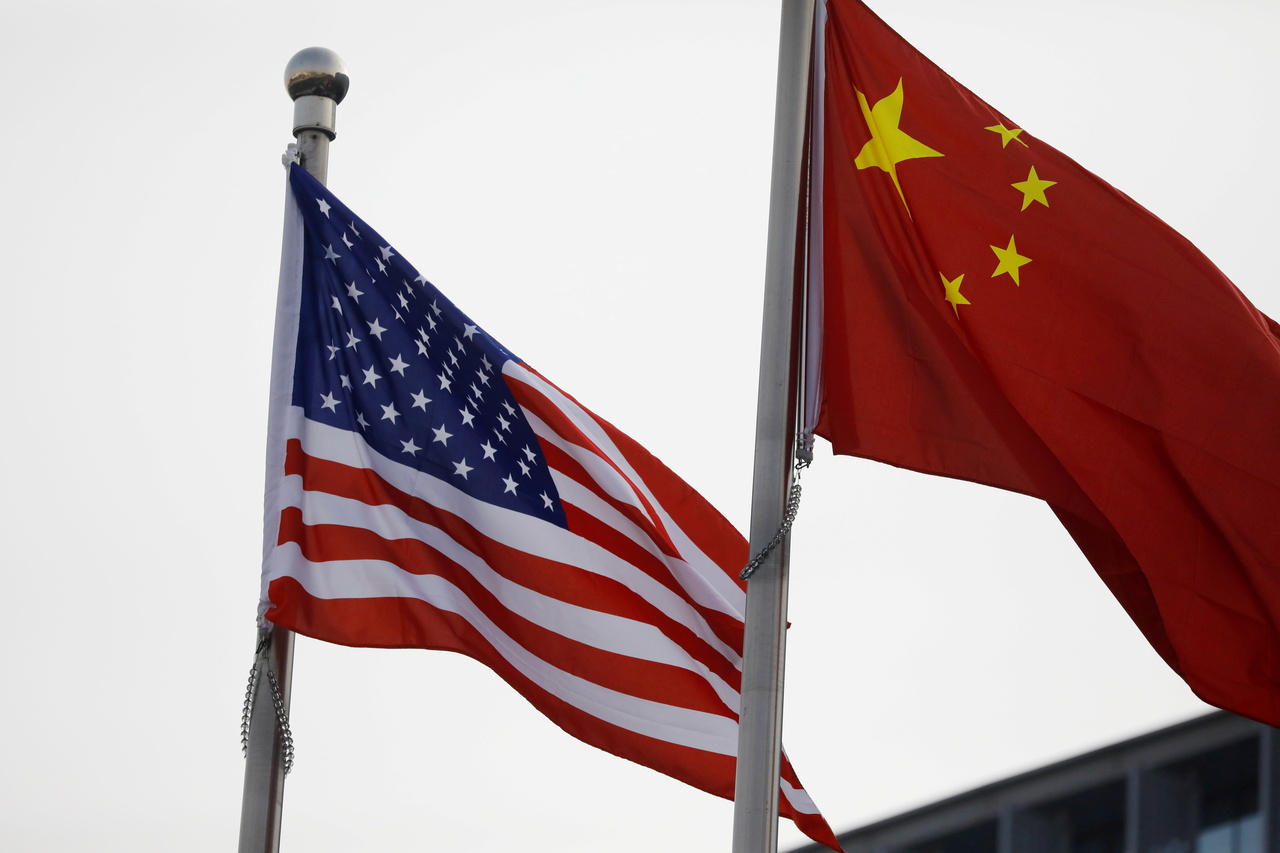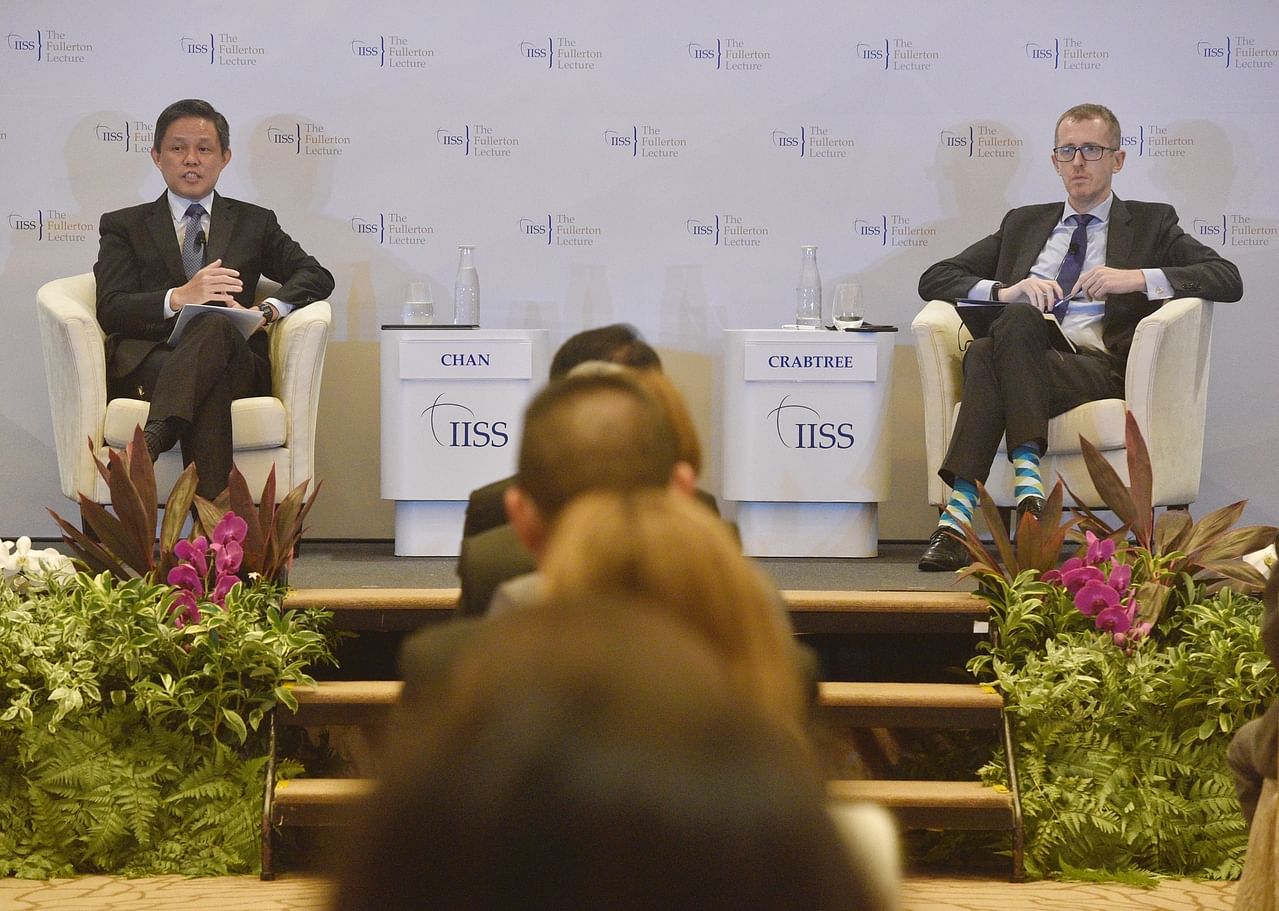Singapore takes principled positions, not sides in US-China rivalry: Chan Chun Sing
Sign up now: Get ST's newsletters delivered to your inbox

Education Minister Chan Chun Sing said it was misleading to compare current US-China tensions with the US-Soviet Cold War competition.
PHOTO: REUTERS
Justin Ong
Follow topic:
SINGAPORE - In the face of great power rivalry between the United States and China, Singapore will choose principles and its own interests instead of taking sides without regard for issue and context.
The Republic also believes countries need to rise above their differences to work together on a global agenda for public health, sustainability and the digital economy, said Education Minister Chan Chun Sing.
He was speaking on Tuesday (Nov 9) at the 41st Fullerton Lecture organised by the International Institute for Strategic Studies (IISS), a London-based think-tank.
He said: "We take principled positions in our own long-term national interests to uphold the rule of international law in the global order, so that might does not equal right.
"When we decide our positions on this basis, we will then be the reliable, steadfast, and consistent partner that others have come to know us for, and what we stand for."
Principles such as an inclusive, open and connected global security and economic architecture, Mr Chan added, are key to Singapore's continued success.
Mr Chan's audience - about 150 people who attended in person at The Fullerton Hotel and hundreds more who joined virtually - was made up of business leaders, diplomats, policymakers and international affairs experts.
In his speech, Mr Chan called on countries to go beyond debate and come together to establish new norms for the digital commons.
He also suggested new and sustainable solutions for a greener world, and highlighted the need to pool resources to recover from the current Covid-19 pandemic, and also prepare for the next pandemic.
Since its founding, Singapore has committed to treasuring and stretching its limited resources to leave behind a better world for future generations, Mr Chan said, "possibly even before the term 'sustainability' entered popular lexicon".
Mr Chan's Fullerton Lecture is the latest in a series of talks on regional and global security issues.
It also featured a question-and-answer segment chaired by IISS-Asia executive director James Crabtree, who last week wrote a Straits Times commentary in which he said Mr Chan would be the first fourth-generation, or 4G, leader to give a major geopolitical speech in the wake of the pandemic.

Minister for Education Chan Chun Sing during the Q&A Dialogue session with James Crabtree, Executive Director of IISS–Asia as moderator . Photo taken on 9 November 2021. He delivered a major address as part of the IISS Fullerton Lectures, a prestigious series of events on regional and global security issues organised by IISS–Asia.
PHOTO: ST
The minister was asked if his remarks suggested that Singapore was moving from simply not wanting to choose sides towards a more proactive stance in terms of wanting to support principles.
He replied that Singapore's inclination to consider each issue carefully and take principled positions was in fact a consistent approach throughout its history.
"We need to do that in order to maintain our credibility," he said. "It's a hard task. We have no illusions about it but if we are consistent, we are principled, we are trusted, I think it makes the job that much easier.
"We will continue to go on that trajectory to make ourselves relevant."
Earlier, during his speech, Mr Chan, who was trade and industry minister from 2018 till May this year, said the US and China have more common interests than they might perhaps wish to acknowledge.
These include ensuring global security and trading orders remain peaceful, stable and connected - even if the two major powers conceive "order" differently - and that strategic lines of communication stay open.
Mr Chan said: "Both are rational nuclear powers and know that war risks mutual assured destruction.
"Both need to secure their global supply chains. Both need the world as their markets. And both want to have secured and connected data flows and networks."
That is why their interdependence across several domains means that "total across-the-board" decoupling is unlikely, added Mr Chan.
"Both of them want to be respected by the other and the rest of the world. Neither would like to see conflict arise because of miscalculation."
Shared interests aside, the US and China are also grappling with similar domestic challenges, said Mr Chan, citing inequality, middle-class struggles, geographical disparity in economic development, and an increasing need to invest in new technologies and training of workers.
He also said it was misleading to compare current US-China tensions with the US-Soviet Cold War competition that spanned decades after World War II.
Where the US and the Soviet Union competed to see which of their differing political and economic systems would prevail, the US and China are both vital components of a single global system and compete within that system, Mr Chan said.
Mr Chan, who was Singapore Armed Forces chief of army before entering politics, said success will not be determined by who can knock the other down.
And neither country can decisively do that to the other without causing damage to oneself, he added.
Instead, the spoils will go to whoever can best "exercise global leadership through the power of their example, rather than the example of their power", Mr Chan said.
US President Joe Biden has twice in his 10-month term used similar language.
Mr Chan said to do so entails acting in enlightened, rather than narrow, self-interest - with the pandemic and climate change issues faced by nations everywhere being two examples.
"There is tremendous opportunity for both the US and China to focus on these global challenges... to win the world over."
The rest of the world, meanwhile, also has responsibility and agency to shape outcomes, he added.
"We can avoid a zero-sum mentality. It is a false dichotomy that one side must lose, for the other side to win. We can send a clear message that we will act on principle, and do not wish to be corralled into taking sides.
"Taking sides regardless of issues and context, breeds irrelevance. And if one is irrelevant, it will almost certainly require taking sides."

